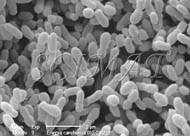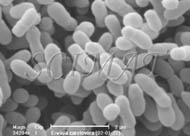 |
 |
| Bar: 2 µm | Bar: 2 µm |
 |
 |
| Bar: 2 µm | Bar: 2 µm |
The name of the soil bacterium Erwinia carotovora is derived from "carrots", the vegetable from which it was first isolated. However, E. carotovora affects many other vegetables, including potatoes, cucumbers, onions, tomatoes, lettuce, and even some ornamental plants like iris. The crops are infected either in the field or in storage. Their tissues become soft and watery and then turn slimy and foul-smelling. Bacterial soft rot of vegetables in Florida was found to be caused by Erwinia carotovora pv carotovora, E. carotovora pv atroseptica, E. chrysanthemi, Pseudomonas marginalis and Clostridium sp. Soft rot bacteria produce enzymes which destroy the "cementing" material between cells. In green peppers, the soft rot bacteria gain entry through holes made by young larvae of the European corn borer. Although Erwinia carotovora bacteria are usually present on the fruit surface, they require a wound to invade the interior. Blackleg and bacterial soft rot in potatoes are diseases that are caused by different, but closely related bacteria, Erwinia carotovora subsp. atroseptica and Erwinia carotovora subsp. carotovora. The latter is very common and has an extensive host range, including most fleshy vegetables. It survives readily in soil and surface waters such as rivers, lakes, and even oceans. These bacteria are capable of multiplying and persisting in the root zones of many host and nonhost crop and weed species. In contrast, Erwinia carotovora subsp. atroseptica is associated mostly with potatoes. Black leg rot causes heavy losses to potato crops. Infected seed tubers may decay without producing a plant, or they may give rise to plants with 'black leg', characterised by dark lesions at the base of the stem. If diseased tubers are present in storage, the bacteria can spread quickly, causing a rise in temperature due to increased respiration by both the infected tubers and the bacteria. Rotting then occurs very rapidly, and may be hastened by the growth of other bacteria such as Clostridium sp. When this occurs, a foul odour develops, along with much exudation of fluid. A sensor capable of detecting rotten potatoes in storage that could save the food industry large sums of money detects organic compounds in the air space around the potato tubers. Erwinia carotovora bacterial culture was purchased from WARD'S. |
| Updated: March 11,
2013.
©SCIMAT 2013 |